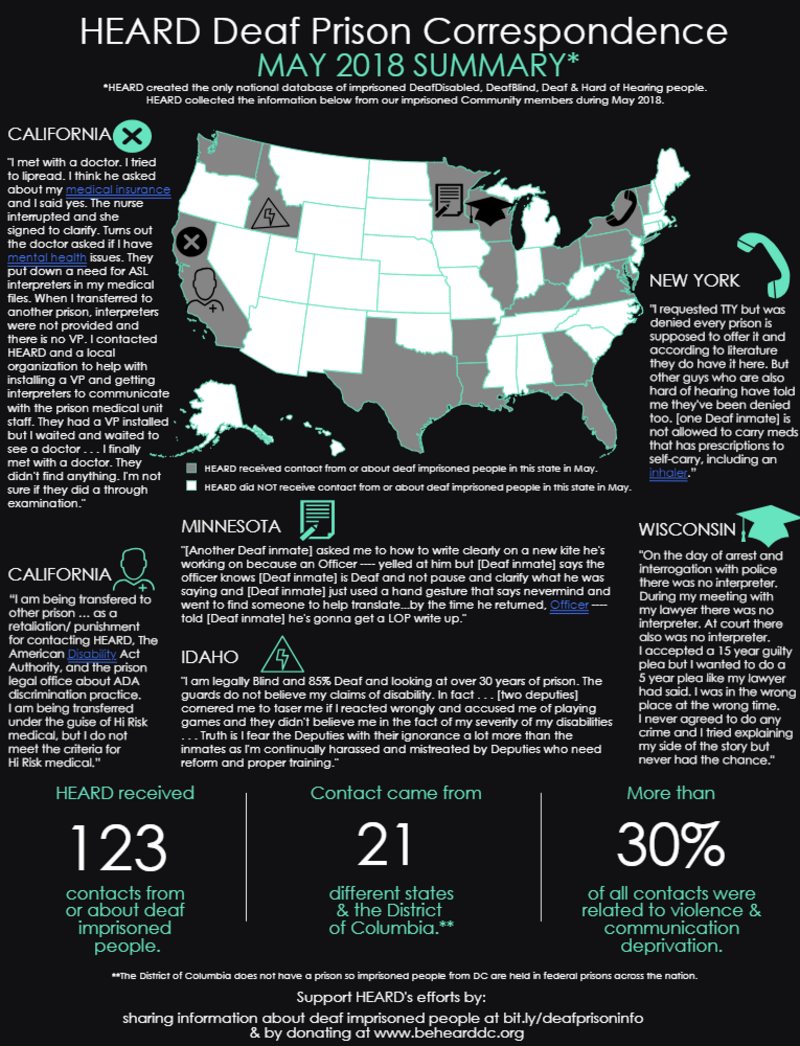
I watched a video news cast in The Daily Moth, a channel that delivers the news in American Sign Language. The headline was: Deaf Man Who Was Incarcerated for 25 Years To Be Released On Parole Tomorrow After Activism by HEARD.
John Wilson Jr, a Deaf man, was stuck in prison for 25 years. On Wednesday, March 6, 2019, Wilson walked out of jail, a free man. Wilson received a life sentence on a murder charge in early 1990. Ever since his arrest, Wilson had maintained his innocence through his attorney, Talila “TL” Lewis. Lewis is the co-founder of HEARD (Helping Educate to Advance the Rights of the Deaf). Lewis claims that Wilson’s rights were violated in prison too often.
Lewis is hearing and fluent in ASL. She stated that when Wilson was first arrested and interrogated, police officers didn’t provide an interpreter. The provision of interpreters is required under the Americans with Disabilities Act (ADA) Effective Communication Requirement. Instead, they asked an officer who knew how to finger spell which is not effective.
According to Lewis, the U.S. Parole Commission denied Wilson parole many times because he refused to express remorse. Wilson maintained that he could not express remorse because he was innocent. Wilson also did not take part in any programs offered at his prison. Wilson says that there were no interpreters for the required programs.
Lewis said that it was difficult to work with Wilson as the federal prison systems did not provide Wilson with access to videophones. By not having access to videophones, it was hard for Lewis to work with Wilson on his case. Due to the lack of access to videophones and the financial constraints on Lewis, his case dragged on for 12 years.
Wilson represents what HEARD is trying to do; to show improvements in the implantation of the ADA and effective communication. HEARD also looks forward to seeing Wilson’s progress and journey after he re-enters society. However, Lewis maintains that Wilson’s re-entry will be challenging. Re-entry is often hard for disabled inmates if the system doesn’t provide access to interpreters or communication support.
The experience of Wilson and his attorney, Lewis, is quite common. It is due to barriers in communication that many Deaf people are jailed despite their innocence. An especially significant example would be Junius Wilson. There is no familial relation between Junius and John. Junius was jailed in 1925 after being accused of assault with intent to rape. As Junius was Deaf and could not communicate, he was declared insane. Junius was sent to North Carolina's mental hospital for blacks where he was castrated.
In the 1970s, the charges against Junius were dropped. As Junius had no family, the hospital kept Junius. It was only after 76 years of confinement that Junius was released in 1994. Upon his release, Junius was moved to a cottage on the hospital grounds. Junius lived at the cottage until his death in 2001.
While the stories of John Wilson Jr. and Junius Wilson may be heart-touching, their stories are common. Communication breakdown is a common factor in the incarceration of many Deaf and hard of hearing people. I would encourage you to visit HEARD’s webpage to learn more.
If you have any questions on the ADA Effective Communication requirement, the rights of people with disabilities in prisons, or about my work, please don’t hesitate to reach out!